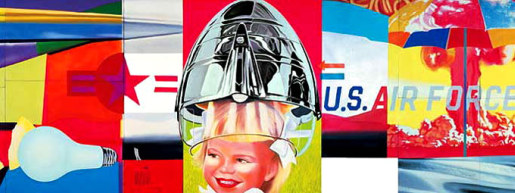I was surprised when I mentioned James Rosenquist to a composer, a bright, musically informed musician. “Who’s that?” the composer said.
I’m skeptical of artists who don’t know about their field. But what about other fields? Do musicians need to know about painting? Or dance? Or writing? Politics? Physics?
A prospective doctoral student at Juilliard told the interviewing committee his favorite symphony by Beethoven was the Ninth. “Is there anything unusual about the last movement,” came the question. It became clear this young composer didn’t know that singers sing in Beethoven’s Ninth Symphony. Some committee members were shocked.
There may be musicians who rely on a certain ignorance to do their own work. Knowing too much about the past might weigh them down? Perhaps every practitioner does not need to be a scholar. Maybe some artists are not artistic connoisseurs?
The desire to discover or look into something may matter more. A lack of curiosity or a lack of desire to inquire is more harmful than not knowing much. Perpetual discovery and wonder seem to go together artistically. Yet, am I naive to think that insights and ideas come more easily if there’s some information to think about, mull over, consider, and reconsider?
Is instant electronic information access increasingly making it unnecessary to know specific facts? (And perhaps our electronic portals are leading to a reconsideration of what a “fact” might even be?) Some graduate students in instrumental music question why they should learn European languages, for example. Translation programs improve. The whole world seems to aspire to speak English.
Shouldn’t an artist develop a nose? Away from statements by authorities, or expert vetting, we benefit from our own sense of art, of artistic value. It’s an important game. When a prospective undergraduate piano student who didn’t get warm receptions from my colleagues was accepted as a student by Leon Fleisher, I doubted my own opinion less.
The willingness to support artistry we perceive even when no one else does — is absolutely necessary.


Did you ask him who Warhol was? Much better known among the general educated public.
Mr. Brubaker,
While your remarks about the possible advantages of naivete will no doubt find many sympathetic ears, I worry about the example from which they spring. It hardly takes a scholar or a connoisseur to know that there is singing in Beethoven’s ninth. That’s one of the core things a casual fan of symphonic music would unquestionably know. Furthermore, playing by instinct is fine for some performers– indeed, necessary for some– but for university professors surely it’s a recipe for disaster, and that student presumably aspires to teach if auditioning for a doctoral program.
I remember walking down the music school hallway with an extremely learned teacher who could cough up excerpts from Wozzeck along with Bushman melodies, jazz standards, Schubert lieder, and West African bell patterns. We passed a poster for a performance of Terry Riley’s “In C” and he asked, “What’s that?” This was several decades ago, but “In C” was already a classic, and for such a knowledgeable person not to know about it was sort of like not knowing about the singers in the last movement of Beethoven’s ninth. Even back then there were already too many vitally important kinds of music for anybody to know all of them.
I would guess that musicians whose work resonates with others tend to be interested in things outside their own music. But which things? Music schools have their lists of things they think students should know, but musicians working now may draw their inspiration from completely different channels. For some composers Beethoven’s ninth may be a less important influence than other kinds of music. Maybe a good question would be, “What are you interested in, and what do you know about it?” That would be one way, without resorting to standardized lists, to distinguish cluelessness from engagement with the art form.
Music schools are starting to realize that music is not a repertory but an incredibly varied human activity. I don’t think anyone knows yet how to train a well-rounded musician or even a specialized musician who is aware of how that specialty fits in the wider world of music. Outside of school, though, musicians of all genres seem to be more comfortable than ever with mixing things up, blurring boundaries, doing away with categories. After all, practicing musicians have always learned from each other across boundaries of style, culture, and time period.
It is also possible to simply be overwhelmed by the amount there is to know, so that it all seems equally valueless, and have to close the gates simply to avoid being buried beneath an avalanche of information. I’ve felt like this at various points over the last couple of decades; anyone you ask is going to have a different idea of who the “must know” composers (or musicians, or scholars, or artists…) are, and if you have more than one narrow field of interest, the list is going to be unimaginably large very quickly.
So I, for instance, am relatively well informed (I think) about symphonic music, musical theatre and art song, but probably pretty clueless about microtonal music, hip-hop and ska.
I agree it seems strange that a doctoral candidate in composition wouldn’t be familiar with Beethoven’s 9th, but I also agree with John Steinmetz that the followup question to that has to be,”Well, then, what do you know”?